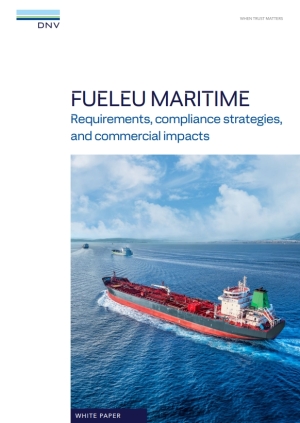


(Posted on 11/12/24)
According to a new DNV white paper outlining FuelEU Maritime requirements and compliance strategies for shipowners, compliance with the upcoming regulations will be expensive but applying certain strategies can significantly reduce the cost.
Effective from 1 January 2025, the rules mandate stringent greenhouse gas (GHG) emission intensity requirements for ships over 5,000 gross tonnage (GT) transporting cargo or passengers for commercial purposes in the EU/ EEA. GHG emissions are calculated from a well-to-wake perspective. In addition to emissions from onboard combustion, this calculation also includes emissions related to the extraction, cultivation, production, and transport of the fuel. The regulation includes provisions for crediting ships using wind-assisted propulsion.
The DNV paper provides shipowners with insights to reduce compliance expenses and avoid major penalties. It contains a comprehensive overview of the regulation, including a case study which highlights a range of different compliance strategies. This shows how the adoption of the most cost-effective strategy can result in savings of up to 16% or USD 21 million over a vessel’s lifetime compared to using Bio-MGO as a compliance option.
Knut Ørbeck-Nilssen, DNV Maritime CEO, said: “It is essential that shipowners understand the requirements and compliance options related to the FuelEU Maritime regulation to make informed business decisions. Adopting a cost-efficient strategy with the right combination of measures can help shipowners reach compliance at reduced costs.
“Just paying the penalty could prove a more costly option. All parties must understand their potential obligations and privileges, and how these might affect their commercial and compliance agreements. Crucial to this is verified emissions data, which can maintain operational and commercial integrity across the maritime value chain.”
The report provides recommendations for shipowners including securing long-term fuel agreements and implementing energy efficiency measures. It also recommends considering pooling as a mechanism for sharing and optimizing costs. This is underpinned by a call to begin preparations immediately. The report also highlights how, by leveraging digital tools, maritime stakeholders can access verified emissions data, a key factor in compliance and maintaining both operational and commercial integrity throughout the value chain.
A key point emphasized in the report is that the International Maritime Organization is also set to introduce similar regulations in the near future, with a net-zero framework expected to be adopted in the fall of 2025 and come into force around mid-2027.
lutely essential that shipowners understand the requirements and compliance options related to the FuelEU Maritime regulation so that they are equipped to make informed business decisions. Adopting a cost-efficient strategy with the right combination of measures can help shipowners reach compliance and significantly reduce costs.
“Doing nothing and paying the penalty could prove to be a costly option. All parties must understand their potential obligations and privileges, and how these might affect their commercial and compliance agreements. Crucial to this is verified emissions data, which can maintain operational and commercial integrity across the maritime value chain.”
The report provides recommendations for shipowners including securing long-term fuel agreements and implementing energy efficiency measures. It also recommends considering pooling as a mechanism for sharing and optimizing costs. This is underpinned by a call to begin preparations immediately. The report also highlights how, by leveraging digital tools, maritime stakeholders can access verified emissions data, a key factor in compliance and maintaining both operational and commercial integrity throughout the value chain.
A key point emphasized in the report is that the International Maritime Organization is also set to introduce similar regulations in the near future, with a net-zero framework expected to be adopted in the second half of 2025 and come into force around mid-2027.
Torvald Klaveness has announced the decision to consolidate all digital services under Klaveness Digital... Read more
The International Association of Dry Cargo Shipowners (INTERCARGO) has renewed its call for straightforward... Read more
The Swedish Club has delivered strong results for 2024, posting a USD 34 million profit and significantly... Read more
In line with NORDEN’s positive long-term outlook for Capesize freight rates, the company have... Read more
OrbitMI, a global provider of maritime software and data products, has expanded its workflow capabilities... Read more
Current ClassNK Senior Vice President Hayato Suga has been appointed as President & CEO as well... Read more
The surge in demand for Cape Size bulk carriers will continue for another six weeks, driven on by increased... Read more
OrbitMI, a leading provider of maritime SaaS software, has announced that Istanbul-based Statu Shipping... Read more
“The International Association of Dry Cargo Shipowners (INTERCARGO) is deeply saddened by the... Read more
As the shipping industry continues its transition to carbon-neutral fuels, ammonia and hydrogen are... Read more